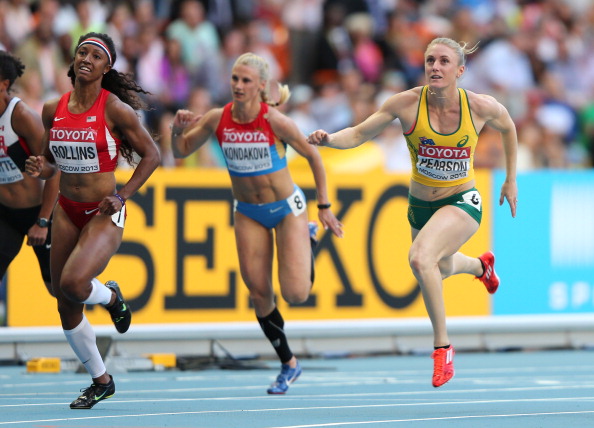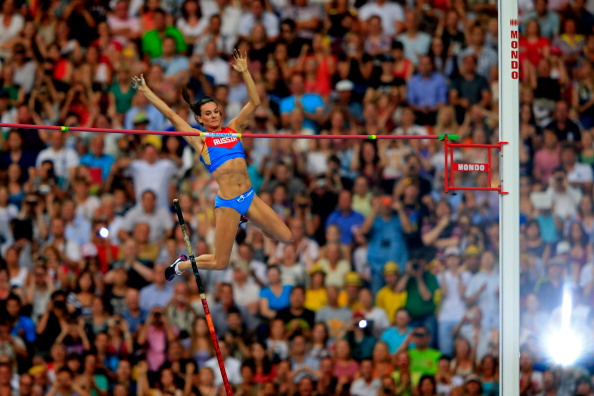Forty-five years ago, at the Mexico City Olympics, a marathon runner from Tanzania finished dead last in the marathon. His name was John Stephen Akhwari. Akhwari had fallen and hurt his knee. He was bloodied and bandaged by the time he straggled to the finish line, more than an hour after the winner. There, he was asked by the filmmaker Bud Greenspan why he had not quit despite obvious pain.
"My country did not send me 7,000 miles away to start the race," Akhwari said. "They sent me 7,000 miles to finish it."
At the recently concluded world track and field championships in Moscow, the American race walker John Nunn fulfilled a mission that in many ways rivals John Stephen Akhwari's for passion and pathos.
And -- absolutely, though it might not seem it at first blush -- dignity.
In the 50-kilometer race walk, Nunn, dead last by about an hour, crossed the finish line in screaming pain. There, he collapsed and had to be carried off the track on a stretcher. Under the stadium, intravenous fluids were pumped into him. An attendant asked if he could take off his singlet and shorts. Nunn was in such pain he could not move. So, literally, his uniform had to be cut off him.
"I learned," he said, reflecting on it a few days later, "you just don't quit."
In the tightly knit race-walking community, Nunn's effort has already achieved a status approaching epic. Perhaps a few hundred people in Luzhniki Stadium saw it as well.
It deserves more.
Nunn finished 46th, in 4 hours, 34 minutes and 55 seconds.
The winner, Ireland's Robert Heffernan, had crossed nearly an hour beforehand, in 3:37.56.
The guy who finished 45th, Sándor Rácz of Hungary, had made it to the finish line some 22 minutes before Nunn, in 4:12.18.
For the last half-hour of John Nunn's ordeal, it was evident to the Luzhniki camera operators of the jumbo-screen TV that Nunn had set himself on a course of action and a test of will that was awful to watch and yet impossible to turn away from.
The cameras were on his every haunted step. Every time he winced or stumbled or grabbed his leg, it was all there on the big screen. Everyone among the few hundred stragglers at Luzhniki, it seemed, was crying out to him -- keep going.
By the time Nunn entered the stadium, the crowd was down to maybe 100 people. These 100 lived every moment of that last half-hour with him. When he lurched across the finish line, collapsing, screaming, there were tears in the stands at what he had done and they had shared, all of them together.
"As soon as I finished," Nunn said, "my mind quit, and my body cramped up. They picked me up and I was just yelling. It was so painful. Tears were just pushing out of my tear ducts. They put me on a stretcher. They put me in some medical room.
They said, 'John, we had to take off your shirt so we can examine you. Can you take it off?'
I said, 'No.'
"Same with the shorts.
"So they cut off the shirt and the shorts.
"They put a towel on me. They put an IV in my arm. It took an hour, a full hour, for the intense cramping to calm down to where I could somewhat move."
The marathon -- 26.2 miles -- is usually thought of as the ultimate Olympic test.
The 50-kilometer race-walk is, in a word, harder.
While race-walking is keenly appreciated around the world, in the United States it is little known and mostly thought of as an oddity.
Which in itself is unusual. The odds of making the U.S. Olympic team in the race-walk -- if you can handle the mental toughness -- would appear to be better than in almost any other endeavor. There are untold numbers of 2:20 marathoners in the United States. And yet there are only a handful of guys who would even consider the 50k walk.
Nunn, for that matter, was the only American entrant in the event in Moscow.
The rules, it must be said, can take a little getting used to.
Walkers must keep least one foot in contact with the ground at all times. Two feet off simultaneously -- what would in ordinary speech you'd call "running" -- is, in the jargon of race-walking, called "lifting," and grounds for a warning. Another rule requires straight legs at the point of first contact with the ground. If three judges give a walker warnings, the third warning leads to a disqualification.
It can all seem -- for those unfamiliar with the rules -- like a spectacle of sorts.
But make no mistake.
Race-walking can be, especially on a warm day like it was the day the 50k went down in Moscow, brutal. The physical demands are one thing. It's the mental grind that is the really hard part.
There are two Olympic-caliber distances, 20 and 50k.
A 50-kilometer race translates to roughly 31 miles.
For comparison, the marathon is 26.2 miles.
A world-class men's marathon is run in just over two hours.
A world-class men's 50k race-walk? Between three and a half and four hours.
The last American to win an Olympic medal is Larry Young, who won bronze in 1968 and 1972. In the U.S., funding is simply not a priority. The discipline has for years been kept alive in the colleges mostly at lower-level schools.
The results in Moscow showed exactly what happens when you invest time, effort and resource in race-walking programs and athletes. Eight different countries put athletes in the top 10.
Behind Ireland's Heffernan?
Russia's Mikhail Ryzhov finished second, in 3:38.58.
Third? Jared Tallent of Australia, 3:40.03.
Nunn's goal coming in was to try to finish in under four hours. A two-time Olympian, he raced the 20k in Athens in 2004 and then moved to the 50k in London last summer, the only American in the race, finishing in 4:03.28, in 43rd place.
It all started well enough for Nunn in Moscow, the kilometers clicking steadily by.
Indeed, through 20 he was hanging in there at a pace of under 5 minutes per kilometer. He turned kilometer 16 in 4:34.
At kilometer 23, though, Nunn started to feel some tightness in a hamstring. It got so bad he could not push off. He backed off. But it got worse. Then the pain moved down and around the leg, into his quadriceps, calf and shins. Then up, into his elbow joints.
"Everything started crunching down," he said. "It was miserable. It turned into Groundhog Day. Every step I was taking, I was, like, this is not going to end."
By kilometer 30, Nunn was doing roughly 6 minutes per kilometer. For conversion, 6 minutes per kilometer would see a jogger cover a mile in about 9 minutes and 40 seconds.
The debate started in his head -- to quit or not?
"At 25k," he said, "I thought, 'No way I'm going to get through this.' "
And this is where the thing gets truly fascinating. Like every racer in the 50k, Nunn went into it expecting pain. Maybe not so soon and not so severe. Even so, the race hurts. It's a given.
What to do?
"I would hit divots in the road. It would shock my body. My leg would go into an intense spasm of pain and lock up and double me over and I would, like, stop for a second or two and then keep moving. Other times, it would spasm so bad and I would try to keep moving but there would be 15 or 20 seconds of intense pain. Two or three minutes later, five at most, there would be the most intense cramping in my legs.
"I realized I would either fall over and be in total convulsion or not do anything and hit the finish line. I thought I would just keep going and see what happens."
Kilometer 44 would prove especially brutal. It took 7:42. More conversion: that would be a jogging pace of 12:23 per mile.
And still he kept going. "I honestly thought I was going to get told by the staff of the race I was going to have to finish out on the course, you are not going to finish in the stadium. But they never did tell me that."
He said, back now in the San Diego area where he is father to a 9-year-old, the two of them proprietors of a cookie business famous in track and field circles, "Part of me, at the end -- I remember when I finished the pain was pain I have never experienced in my life.
"There was a part of me that was crying out of humiliation. I was feeling like I was getting so much better," meaning at 50k strategy. "And then everything happened that day -- there was devastation at what had gone on.
"But in the 50k you just can't quit. Quitting became not an option. I know other people -- other people in the race said, 'I'm done,' and walked off long before the finish line. But USA Track & Field paid for my airfare and training camp and for us to stay at a nice hotel."
And he said, in an echo of John Stephen Akhwari so many years earlier, "I had been asked to race the 50k. And so I did."















